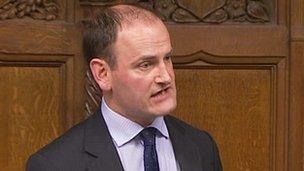MPs debate case for UK pulling out of European Union
- Published
- comments

A Conservative MP has likened the UK's membership of the EU to "being shackled to a corpse" as the Commons debated the case for quitting the union.
Douglas Carswell told MPs that talk of withdrawal was now a "mainstream" rather than a "maverick" view.
His private Member's Bill would repeal the 1972 act allowing the UK to join the former European Economic Community.
He admitted it had little chance of becoming law but said the issue could not be ignored by the ruling elite.
Although Friday's debate on Mr Carswell's bill only lasted about half an hour - due to parliamentary scheduling - MPs hailed it as a symbolic moment and one claimed those present were "making history" by even discussing the issue.
Mr Carswell also told MPs the debate was the first in Commons history to have been "crowd sourced" after the subject of it was selected by readers of the Guido Fawkes blog.
David Cameron is facing pressure from his own backbenchers to promise an "in/out" referendum on the EU.
The PM opposes such a step but has said he would consider seeking "fresh consent" from the British people if promised changes to the eurozone fundamentally alter the UK's relationship with the rest of the EU.
But many Tory MPs want the prime minister to go further and pass a law committing the next government to hold a referendum on Britain's relationship with the EU. A year ago 81 Conservative MPs rebelled against the party line to vote for a referendum.
'Exit simple'
Mr Carswell wants to repeal the European Communities Act (1972) which saw the UK join the EU - or the European Economic Community as it was called at the time - but the prospect of this happening is very slim.
Private Member's bills - a way for MPs to propose legislation on a subject of their choice - rarely make it into law unless they have the support of the government.
Opening the debate, Mr Carswell said leaving the EU could no longer be "dismissed as unthinkable" - since the view was increasingly shared among the public.
"It is no longer a marginal view confined to mavericks," he said. "It is a legitimate point that is starting to go mainstream."
'United States of Europe'
Mr Carswell said the UK had paid more into the EU than it had got back in all but one year since joining and, likening membership to "being shackled to a corpse", he said UK contributions to the EU had risen by 70% in the last three years.
He said he had not tabled the bill in the expectation it would be approved but to kickstart a debate on "the mechanics" of withdrawal.
"Leaving the EU is going to be simple but it is not going to be easy...It can be done but those of us who want out need to give it some serious thought."
Conservative colleague Philip Hollobone said the common market promised to UK voters when they backed entry in 1975 had "morphed" into an economic and political union and he feared a "United States of Europe is just around the corner".
The UK's multi-billion pound contribution to the EU could be better spent on recruiting more teachers, nurses and doctors, he added, while tighter control over immigration could only truly be achieved outside the 27-member union.
During the thirty minute debate, Tory MPs Edward Leigh and Steve Baker also spoke in favour of withdrawal but Labour's John Spellar asked why Mr Carswell's bill made no mention of a referendum on the issue.
'Hard-headed'
Attitudes to Europe on the Conservative benches have steadily hardened since the euro crisis began.
Foreign Secretary William Hague warned recently that the British public's disillusionment with the EU is "the deepest it has ever been" and Education Secretary Michael Gove reportedly said it was time to tell the EU to "give us back our sovereignty or we will walk out".
Earlier this week, Mr Cameron pledged to ensure the UK's interests were defended as eurozone countries move towards closer union and he has threatened to veto the next EU budget if Brussels insists on an above-inflation rise.
Responding for the government, Europe minister David Lidington said the EU had flaws and drawbacks but continued membership was in the UK's national interest.
"Our membership has arisen and has been maintained because of a hard-headed, calculated and pragmatic decision by successive governments, including successive leaders of the Conservative Party," he said.
"Membership is in the national advantage of the British people in terms of what it gives us through trade, market access, attracting direct foreign investment and increased diplomatic leverage over foreign and security policies."
Labour have also raised the prospect of some form of referendum in the future but, like Mr Cameron, the party's leadership oppose a direct vote on whether to stay or exit.
The Lib Dems say a referendum would be a distraction at a time of seismic challenges for Europe and the UK should focus on protecting its interests by pushing for reform of the single market and other issues.
- Published23 October 2012
- Published22 October 2012
- Published14 October 2012
- Published10 October 2012
- Published28 September 2012
- Published14 September 2012